From toilet brushes to memes: China’s creative backlash against Trump’s tariffs
From creating memes and satirical art to buying Trump toilet brushes, Chinese netizens are expressing their displeasure with US President Donald Trump’s latest reciprocal tariffs in ingenious and humorous ways. Lianhe Zaobao’s China Desk finds out more.
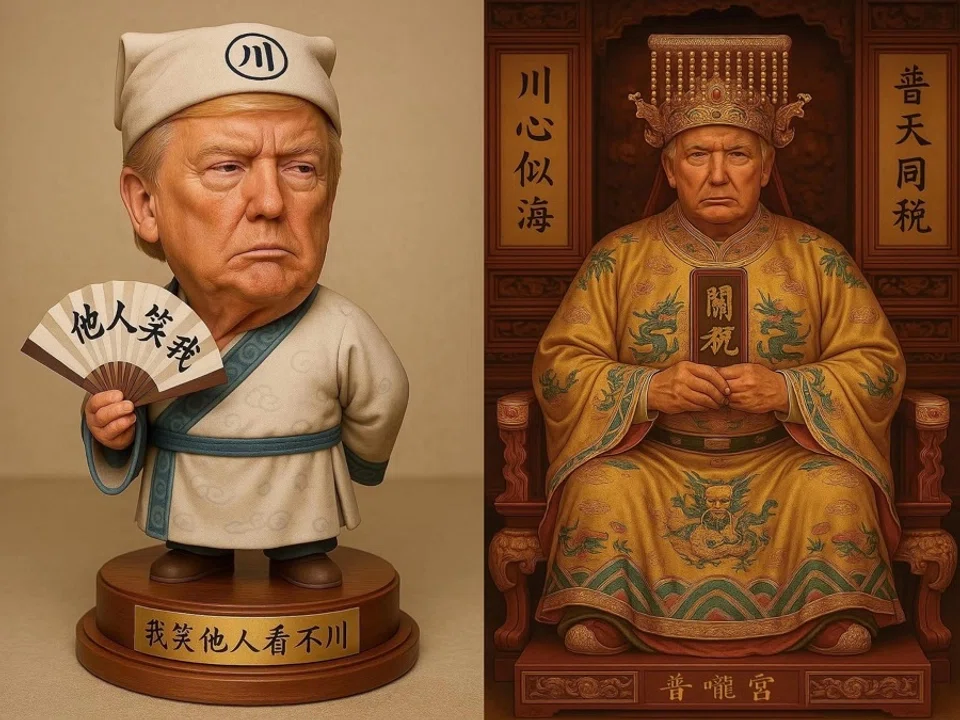
US President Donald Trump continued to escalate the tariff war against China this month. Combined with the 20% tariffs previously imposed on China due to the fentanyl issue, the Trump administration has raised tariffs on Chinese goods to a staggering total of 145%. This move not only provoked countermeasures from Beijing, it has also sparked outrage among Chinese netizens. Anti-Trump sentiment has surged online; mockery of Trump is appearing everywhere in numerous forms, from cartoons, online jokes, and Peking opera to tongue-in-cheek merchandise.
Artistic expressions of defiance
On 11 April, the renowned “wolf warrior” Chinese illustration graphic team Wuheqilin (乌合麒麟) released a new artwork titled “Not Kneeling” (就不跪) on Weibo, conveying the message that China will not yield to the US in this tariff war.
The artwork portrays a starkly different Statue of Liberty: frail and emaciated, her clothes tattered. No longer standing tall, she slumps in a chair, gagged and blindfolded. The torch of enlightenment is gone from her right hand, and the Declaration of Independence lies forgotten in her left lap, surrounded by crows — possible symbols of decay or impending doom.
Perched atop the Declaration of Independence is a grotesque, clownish figure resembling Trump, perhaps symbolising how the current president has betrayed the nation’s founding principles. The clown wields a sceptre labelled “Tax,” with a speech bubble proclaiming “5000%,” a detail dripping with satire.
Netizens wrote that China “is inherently proud and would not kneel”, “our ancestors never bowed down, we would not dare to bend our backs!”
Many figures kneel before the Statue of Liberty and the clown, except for a lone figure in red standing defiantly in the centre. At the bottom of the artwork, the words “I AM STANDING HERE!” are inscribed in English.
On the day “Not Kneeling” was released, Wuheqilin’s post on Weibo amassed over 150,000 likes and nearly 6,000 comments.
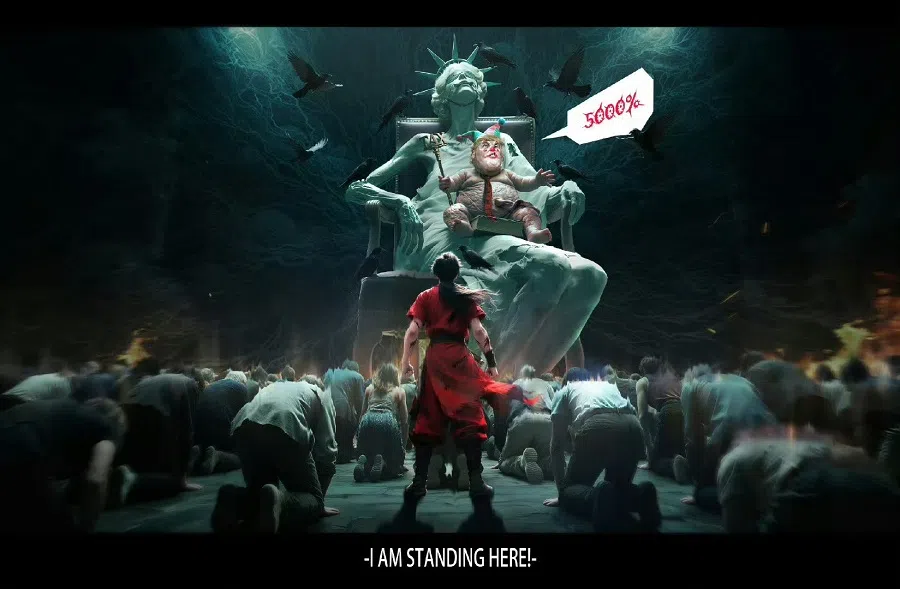
Many Chinese netizens interpreted the painting as a message that China would not keel over in the trade war with the US. Netizens wrote that China “is inherently proud and would not kneel”, “our ancestors never bowed down, we would not dare to bend our backs!”, and “fight until we are completely victorious!” Another netizen lamented: “the giant, demonic enfant terrible is sucking its mother to the bones”.
The Wuheqilin team, which includes main creator Fu Yu, chief planner Hu Muyang and chief executive Kang Yuxiang, have been exploring political themes since November 2019. In 2020, when the Trump administration referred to Covid-19 as the “Chinese virus”, Wuheqilin released works such as “White House Painter” (白宫粉刷匠) and “Crowning the Jester” (为弄臣加冕) in retaliation, satirising the US’s ineffective handling of the pandemic.
From reel life to real life
Peking opera film Raid on the White Tiger Regiment, released on the big screen in 1972, also went viral on the Chinese internet recently due to the intensifying China-US tariff war.
The film is a modern Peking opera based on the 1950s Chinese War to Resist US Aggression and Aid Korea, later becoming one of the “eight revolutionary model plays” during the Cultural Revolution. The film tells the story of a Chinese People’s Volunteer Army reconnaissance team disguising themselves to raid the command of the South Korean Army’s elite unit, the White Tiger Regiment (the 1st Regiment of the South Korean Army’s Capital Mechanized Infantry Division).
He also sang: “no matter how they pretend to negotiate while continuing to engage in actual warfare, a wolf in sheep’s clothing will forever be a wolf. We never harbour illusions about the enemy, we must be even more vigilant, hold firm to our guns and defeat the US imperialist wolves!”
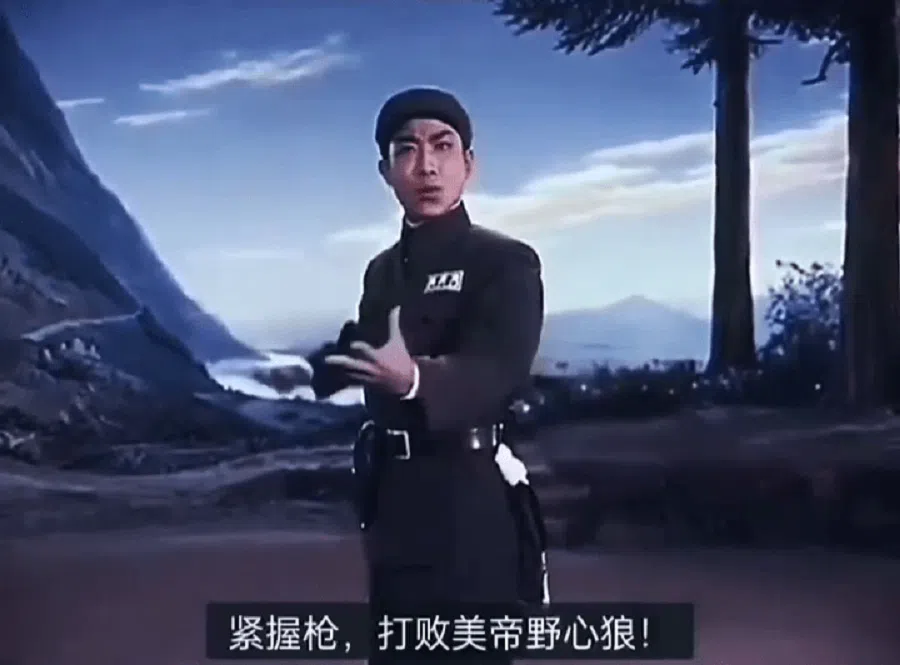
In the film, Chinese Peking opera actor Song Yuqing starred as the lead character, Yan Weicai, platoon leader of the recon platoon who sang: “US imperialists are wildly ambitious, dreaming of world domination. When they fail, they speak of peace with a smile on their face and aggression in their hearts; once they regain their strength, they bare their fangs and go mad again”. He also sang: “no matter how they pretend to negotiate while continuing to engage in actual warfare, a wolf in sheep’s clothing will forever be a wolf. We never harbour illusions about the enemy, we must be even more vigilant, hold firm to our guns and defeat the US imperialist wolves!”
Half a century after the film’s release, some Chinese netizens leveraged the past to express their thoughts about the present, declaring that not a word of this model play needed to be tweaked as “it fits the current China-US competition very well; it is so moving! Decades later, it is still applicable!”
Chinese netizens launch a meme war against Trump
Over the past week, there has been a flood of Trump mockery from netizens who dubbed him the “Tariff Emperor” and hailing “long live the [tariff] emperor”.
Some netizens have reposted a satirically edited image of Trump on RedNote, showing him dressed in imperial robes and holding a tariff card while sitting regally. Netizens in the comment section have hailed it as a “masterpiece for the ages”.
The image shows Trump (or 川普 chuanpu as his name is also transliterated) with two plaques flanking him: one reads chuan xin si hai (川心似海, lit. “Chuan[pu]’s heart is like the sea”, implying vastness or magnanimity) while the other reads pu tian tong shui (普天同税, a play on the idiom pu tian tong qing (普天同庆, meaning universal celebration). By substituting qing (庆, celebration) with shui (税, tax), it mockingly suggests “universal taxation”). Beneath him, the words pu long gong (普咙宫) are a phonetic pun on a Taiwanese phrase (噗咙共), which means a lack of common sense.
![Netizens dubbed Trump the “Tariff Emperor” and hailing “long live the [tariff] emperor”. (Internet)](https://cassette.sphdigital.com.sg/image/thinkchina/1befb5ceef117ad28dead5eeab695fc24ed00e4018b18bd78e6334afa17cad4d)
Chinese netizens have also created a figurine of Trump in an ancient costume, wearing a hat with the character chuan (川) on it. He holds a folding fan inscribed with ta ren xiao wo [tai feng dian] (他人笑我(太疯癫), meaning “others laugh at me for being too crazy”), and stands on a base which bears the inscription: wo xiao ta ren kan bu chuan (我笑他人看不川(穿), meaning “I laugh at others for not seeing through the situation”). Here, the Chinese character for “seeing through the situation”, 穿 chuan, is replaced with 川 chuan, which refers to Trump. This recreates a scene from the Hong Kong comedy film Flirting Scholar starring Stephen Chow, where his character recites the same two lines.
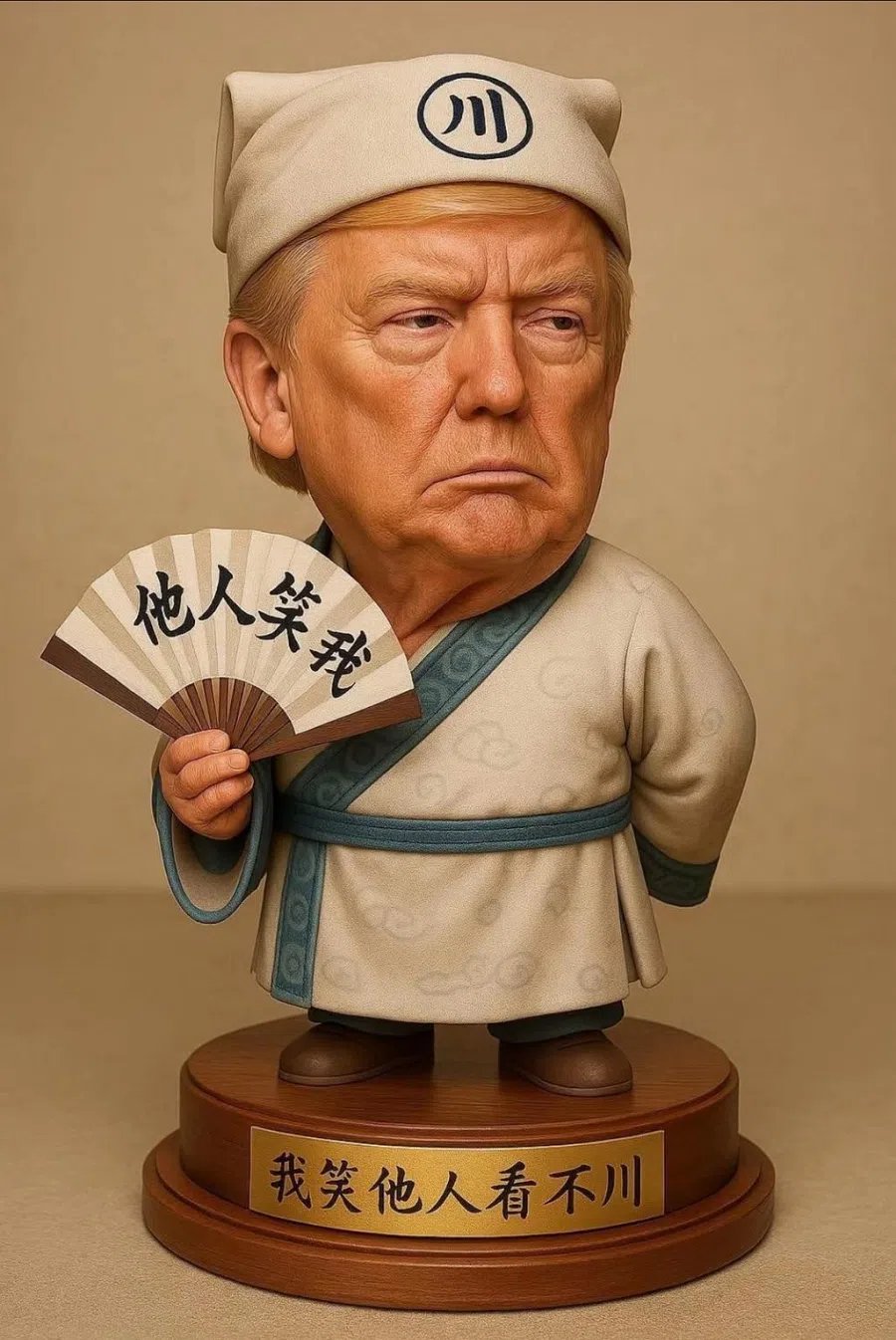
Some Chinese netizens have also posted various Trump lookalikes on RedNote, including a golden pheasant at the Beijing Zoo, as well as dogs styled to look like him.
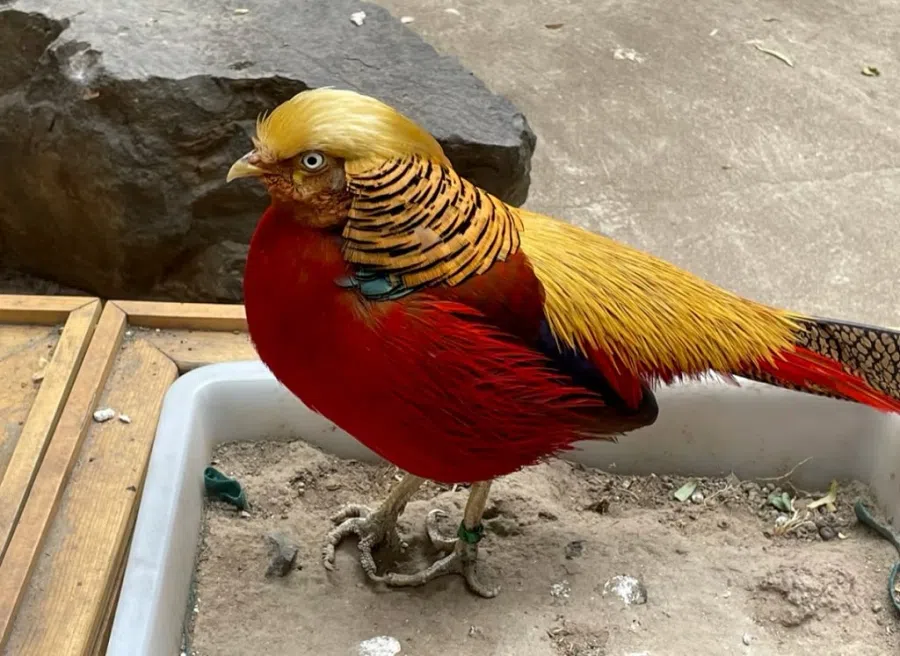

Mugs and Trump toilet brushes: online retailers cash in on the tariff war
On the other hand, a large number of cultural and creative products related to the China-US tariff war have appeared on e-commerce platforms. For example, several of these platforms have recently started selling toilet brushes featuring a caricature of Trump on the handle. A customer service representative of an online store mentioned that this product, which is manufactured in Yiwu, has been well-received since its launch. Some netizens humorously refer to it as “the retaliation of Yiwu”.
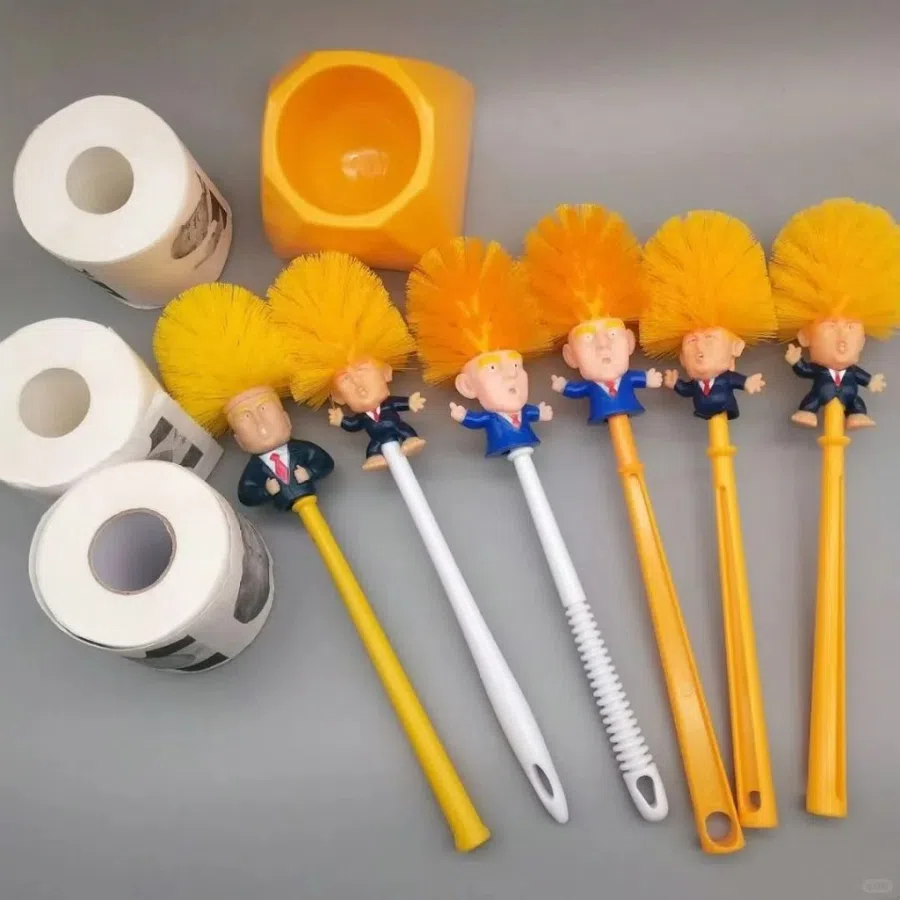
However, the names of these sardonic cultural and creative products are often less explicit. On e-commerce platform Pinduoduo, few products can be found directly with telangpu (特朗普, Trump), with most shops using labels such as te lipu (特离谱, lit. “very absurd”), te lang (特朗) or simply zongtong (总统, president).
Recently, platforms such as Taobao, Pinduoduo and Douyin saw the emergence of “Participant of Reciprocal Tariff War” commemorative mugs, sparking a buying frenzy. Several netizens flashed their newly bought mugs on Weibo, proclaiming, “Alas, I guess I have also participated in the war!”; “With this mug, I guess I can say that I have witnessed history!”
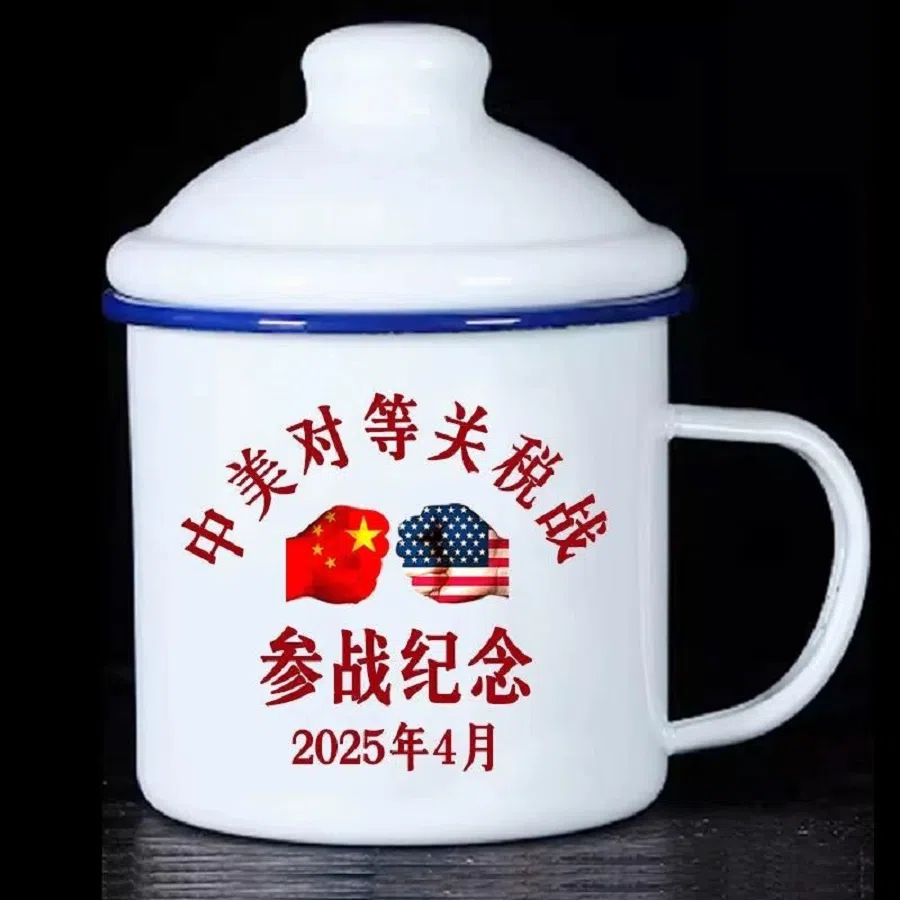
Nevertheless, such commemorative mugs soon vanished from the e-commerce platforms. Now, one can no longer find relevant products under the search terms “reciprocal tariff mug” or “participant of reciprocal tariff war” on Taobao, possibly because the authorities have removed them to cool down public sentiment. These products were still sold by a handful of sellers on RedNote on 14 April.
China united in defiance against the US, but balance is also needed
Chinese foreign ministry spokesperson Mao Ning has been sharing videos of speeches by the late Chinese Communist Party leader Mao Zedong on X, which are widely circulated by Chinese netizens.
She posted a speech by Mao Zedong on 10 April on X, along with the caption: “We are Chinese. We are not afraid of provocations. We don’t back down.”
The video depicts a meeting of the Chinese People’s Political Consultative Conference in February 1953, which occurred at a time when the War to Resist US Aggression and Aid Korea had been ongoing for over two years. Mao Zedong said, “As to how long this war will last, we are not the ones who can decide. It used to depend on President Truman and it will depend on President Eisenhower or whoever becomes the next US president. It’s up to them. No matter how long this war is going to last, we’ll never yield. We’ll fight until we completely triumph.”
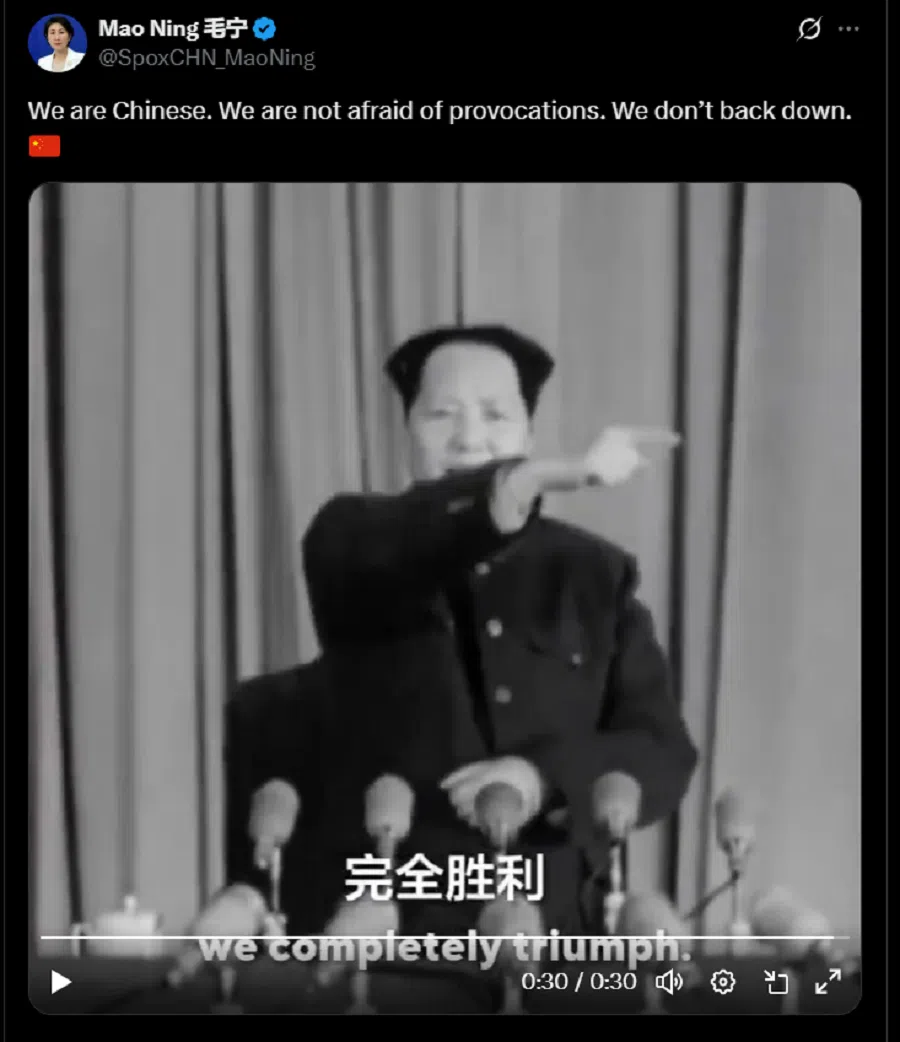
This narrative garnered considerable support among the Chinese, who believe that Beijing should not tolerate or consent to this behaviour but should retaliate an eye for an eye. Otherwise, it would be coerced into making more concessions in the future.
On 11 April, Mao Ning again posted an image of an English quote by Mao Zedong, from his speech in 1964: “The US intimidates certain countries, stopping them from doing business with us. But America is just a paper tiger. Don’t believe its bluff. One poke, and it’ll burst!” Mao Ning then wrote the caption: “China never bluffs — and we see through those who do.”
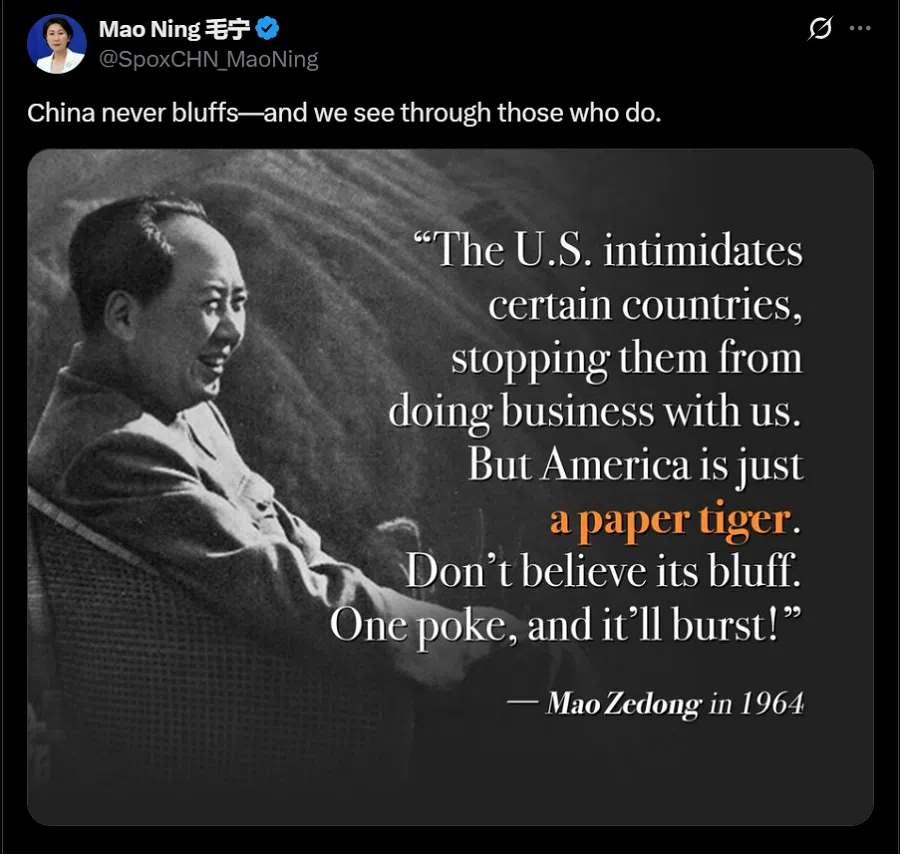
Public information shows that 53-year-old Mao Ning hails from Xiangtan, Shaoshan in Hunan province, the same birthplace as Mao Zedong.
Despite severe external challenges, the Chinese government and people are united in defiance and stand in solidarity with each other against the US, providing strong public support for Beijing’s firm retaliatory measures. But at a juncture where China has yet to completely forsake negotiations with the US, it is perhaps also appropriate and necessary to temper the promotion of nationalist and patriotic sentiments through various channels. Once the tide of public opinion becomes uncontrollable, the room for compromise between Beijing and Washington will be significantly constrained, making it much more challenging for both countries to reach an agreement.
This article was first published in Lianhe Zaobao as “中国网民力抗“关税帝君””.





